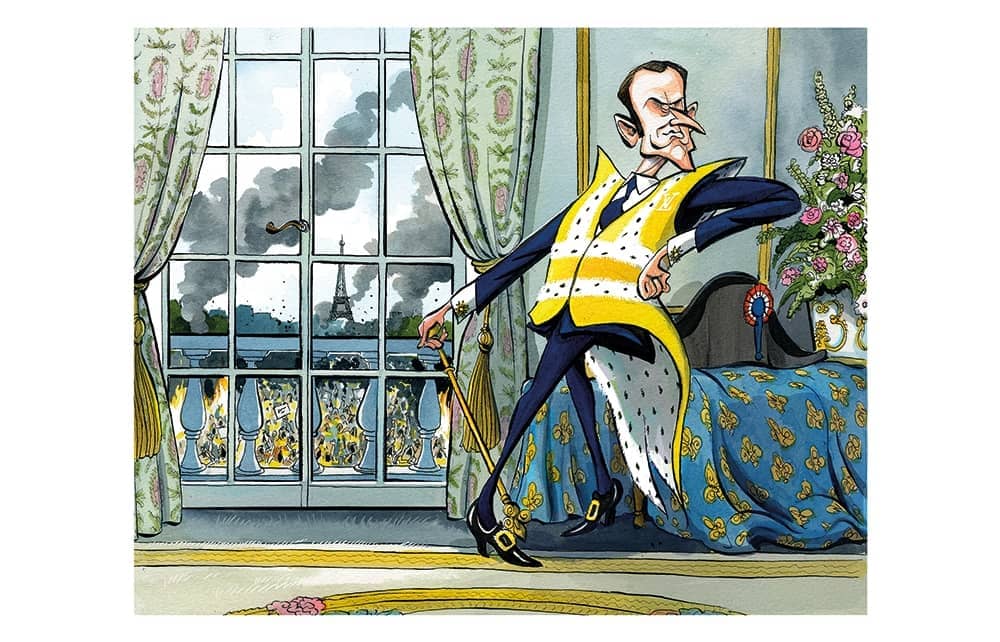Contrary to popular myth, on the English side of the Channel, at least, the French can queue. Across the country thousands of men and women have for days sat patiently in their vehicles waiting their turn to fill up their tanks with petrol. Tempers have frayed on occasion, which is no surprise given what is at stake.
An opinion poll on Wednesday stated that two in three French people’s livelihoods have taken a hit because of the petrol shortage, a consequence of strike action at four refineries and a storage facility because of a wage dispute.
Nonetheless, the same poll disclosed that 42 per cent of people support the strike action, compared to 40 per cent who don’t, with the ire of people directed primarily at Emmanuel Macron and his government. Nearly eight in ten believe the president has not handled the three-week strike well.
This is music to the ears of the hard-left union behind the strike, the CGT (Confédération Générale du Travail), for years the scourge of successive governments. In a television interview on Wednesday evening, Macron urged the unions and the oil companies to find a solution for the good of the country.
The government has been bracing itself for this moment for months
‘I want the leaders of these companies and the employees to be responsible,’ said Macron. ‘We cannot let the country be blocked because a few people want the industrial action to go even further.’
There was some good news for the government on Thursday. Strikers agreed to return to work at one refinery, Fos-sur-Mer, in southern France, while at another, in Dunkirk, workers were forced to resume production after they were served with papers by the police. Clock on, they were told, or run the risk of six months in prison.
Negotiations to end the dispute lasted until the early hours of Friday morning and optimism is growing that the strike could soon be over.
In recent days, the strikers and their union representatives have been engaged in a bitter propaganda battle with the government. It was claimed in some media outlets that refinery strikers were being greedy, demanding additional wages to the €5,000 (£4,300) per month that they already earn. That drew a furious response from the picket line with strikers using social media to declare that their monthly take home pay is less than half that figure.
The refinery strike is a microcosm of a broader struggle between the government and the CGT Union, led by Philippe Martinez. He first drew attention to the effect of the cost-of-living crisis twelve months ago, but his call for widespread street protests fell largely on deaf ears; France was still in the grip of the Covid crisis and Macron’s draconian health restrictions deterred demonstrators.
A year later, however, and many in France are spoiling for a fight with their president. As I’ve written frequently in recent months on Coffee House, the French are downcast and disillusioned. Since Macron came to power in May 2017 he has treated the people like children, alternating between patronising them and threatening them. This is their chance to fight back, and the refinery dispute is likely to be the opening battle in a long and bitter industrial war.
Martinez has called for a general strike on Tuesday, and among those who have said they will down tools are train operators, bus drivers, hauliers and staff in the nuclear industry.
Macron’s myriad enemies, be they in the National Assembly, the unions or on the street, know that he has been severely weakened by his failure to win an absolute majority in June’s parliamentary elections. The power that he wielded during his first term in office has drained away over the summer.
On Sunday, tens of thousands of people are expected to march through Paris in what organisers have billed as a protest ‘against the high cost of living’. More than 3.5 million leaflets have been distributed across France and half a million posters plastered to walls, encouraging people to descend on the capital in a show of force.
All the main left-wing parties will be represented, along with union leaders and figures from the world of science, arts and entertainment. Sixty prominent voices from these fields signed an open letter in a Sunday newspaper last weekend – among them Annie Ernaux, this year’s Nobel Prize winner for Literature – in support of the rally. But the words that have caused the most controversy came from Jean-Luc Mélenchon, the figurehead of the far left. In a tweet urging people to march on Sunday, he said they should take inspiration from the insurrectionists of 1789 who deposed Louis XVI.
The government has been bracing itself for this moment for months; the only surprise is that it’s taken so long.
‘We expected a difficult autumn but, for the moment, this is not necessarily the case,’ a senior government official said last month. There were, however, he added, signs of the same sullen anger that precipitated the Yellow Vest movement of 2018.
In the four years since, the government has recruited more police – and raised a unit specialised in urban warfare – as well as ordering a fleet of 90 new armoured cars, each one weighing 14.5 tonnes, twice that of the obsolescent model. The battle lines are being drawn. Now it’s just a question of when the French patience expires.







Comments